Good Thinking COVID-19 Insights Report #1
1. About us
Good Thinking is London’s health and care partnership’s digital mental wellbeing support service providing proactive self-care for the four most common mental health conditions: anxiety, low mood, sleeping difficulties and stress.
Anonymous and available 24/7, Good Thinking supports individuals including those who may not wish to access traditional healthcare services, people who prefer not to be treated in a clinical setting and those who are worried about the stigma around seeking mental health support. During its discovery research phase, Good Thinking talked to numerous Londoners and learned they did not always want traditional service models – they wanted personalised resources and tools to help them to manage their own health and wellbeing.
The short film below describes how Good Thinking works.
Good Thinking continues to develop and respond to the feedback from its users and as this report shows, its usage continues to grow. It was developed through a partnership of local authorities (led by Directors of Public Health), London’s NHS, Public Health England, the Mayor of London and is delivered by Healthy London Partnership.
2. Glossary of terms
- Data: facts and statistics collected for reference or analysis.
- Impression: the number of times a piece of content (an online advertisement) is seen.
- IAPT: Improving Access to Psychological Therapies (face to face talking therapies).
- Keyword: in search engine optimisation, the particular word or phrase that describes the contents of a web page.
- New visitor: visitors who have reached a site for the first time. This is important in comparison with return visitors as an indication of loyalty and site value.
- Organic search: describes a search that generates results that are not paid advertisements.
- Pageviews: the instance of an Internet user visiting a particular page on a site. A pageview is recorded whenever a full page of your website is viewed or refreshed.
- Pageviews per visit: the average number of page views per visit over a given time period.
- Quizzes: In this context, it is a simple decision aid for GT visitors to complete which takes them to a conclusion about the type of support or advice they may need.
- Returning visitor: a visitor who can be identified with multiple visits, through cookies or authentication Search intent: the ultimate goal of the person using a search engine.
- Unique visitor: the number of distinct individuals who request pages from a website during a specific period, no matter how many times they visit.
- User: A person who uses the web.
- Visits – the number of times a site is visited, no matter the number of unique visitors that make up those sessions.
3. Executive Summary
Good Thinking is London’s NHS-approved digital mental wellbeing service. Supported by Public Health England, Thrive LDN, the Mayor of London, London’s NHS and London Councils, it is led by a steering group chaired by Javina Sehgal, Managing Director of Harrow CCG. Imran Choudhury Director of Public Health, London Borough of Sutton represents London’s Directors of Public Health. Tracy Parr is Director of Transformation for Good Thinking with Dr Richard Graham as Clinical Director. The programme reports directly to its multi-partner steering group and to the Mental Health Transformation Board.
This insights report
This report summarises the headline findings of data collected on the 184,657user interactions with the service; 74,876 conclusions (advice on what to do in relation to a reported health issue) from the digital mental health self-assessment triage tools; insights from what people are entering into Google search; and results of local surveys, between Dec – June 2020.
Key insights
• Users of Good Thinking increased by over 300% during the COVID-19 pandemic with over 108,00 users visiting the site 150,000 times.
• Alcohol problems and anxiety remain the predominant conclusions from the mental health self-assessments, whilst issues with sleep have increased.
• Visitors to Good Thinking continue to want services that ‘assess me’; are ‘free’; are ‘digital’; or for use ‘by myself’
• In a survey, third of young people aged 14-24 indicated that they left the house once a week or less between April – June 2020 and this figure appears to be rising, suggesting that health anxiety may impair a return to a more active life.
Data sources and methodology
Data has been analysed from:
• Google analytics on use of the Good Thinking Service and from self-assessment data. This is presented as a monthly comparison between Mar – Jun 2020 compared to baseline figures from Dec 2019 – Feb 2020.
• Online search intent research generated by a specialist digital media marketing company showing what Londoners are searching for online in order to support their mental health.
• Fortnightly online surveys with young people, as reported in Checking in: Voices of young people during lockdown report – a collaboration with Partnership for Young London, and TikTok.
Recommendations
Good Thinking:
• Continue to consider how the insights and opportunities from the digital world can further support London’s health and care system with planning for the transition and recovery periods of COVID-19.
• Continue to work with Thrive LDN to ensure those groups most disadvantaged by COVID-19 are supported on and off-line given the risk of recurrence and/or localised outbreaks.
• Undertake behaviour change campaigns to support those with issues around the use of alcohol and sleep, or those reluctant to leave their homes, and undertake targeted polling on Good Thinking to explore in more detail the main factors contributing to need
Regional mental health leadership:
• Enhance messaging that both mental health and IAPT services are available and can be accessed by those in need
Thrive LDN and PHE
• Include Good Thinking insights within wider research and intelligence gathering
• Searches using Google in early July 2020 outline that anxiety and social anxiety issues remain high. In addition many Londoners appear unclear what mental health services are available and whether they are open.
Next steps
Good Thinking will continue to collect, analyse and circulate its findings to the mental health resilience cell to inform planning for Londoners’ mental health.
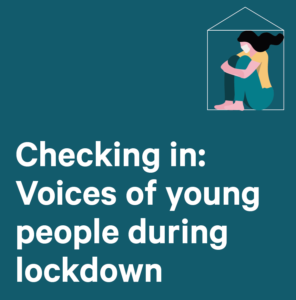
4. Introduction
This report provides headline insights on the mental health and wellbeing of Londoners, collected by the Good Thinking team between December 2019 – June 2020. During this time, the use of Good Thinking by Londoners increased significantly. The service was accessed over 184,000 times by more 132,000 individual users around the clock.
As an anonymous service that can be accessed privately, Good Thinking provides a unique opportunity to learn about the health-seeking behaviours of Londoners and identify potential unmet needs. This report has been developed to inform the work of Public Health England and the wider London partnership in understanding the effects of COVID-19 across London, and the resultant impact on Londoners’ mental health and wellbeing. The insights will help inform Thrive LDN’s emerging strategy and also the wider NHS response as users of Good Thinking may seek online self-help at an earlier stage than when they present to primary care or other services. It will also inform the development of content and services within Good Thinking so that it remains relevant to the needs of Londoners.
Good Thinking will continue to support understanding of the longer-term impacts of COVID-19 on Londoners’ mental health and the disproportionate impact on specific groups who are likely to be more adversely impacted both directly and indirectly by COVID-19.
5. Key Insights
- Traffic to Good Thinking increased three times during the period of lockdown prompted by COVID-19. In peak lockdown (March and June 2020) over 108,000 users accessed the service on 150,000 occasions. Whilst reflecting a wide and effective communications drive led by ThriveLDN, this also demonstrates the rising need of Londoners for accessible mental health support during this unprecedented time of uncertainty and anxiety.
- The conclusions generated from the Good Thinking clinically validated self-assessments during this period showed almost half related to alcohol use and anxiety. This most likely relates to the impact of lockdown on people’s mental state; both the physical restrictions and the economic impact on individuals. The proportion of conclusions indicating issues with sleep increased significantly to a third of all conclusions, again reflecting the challenges of the COVID-19 impact.
- Over 75% of those completing the Good Thinking short quizzes indicated that they wanted support that either ‘assesses me’; is ‘free’; is ‘digital’; or for use ‘by myself’. As an anonymous self-care digital service this reinforces the core aims Good Thinking was designed to deliver.
- Research undertaken on how people are searching for help online for their mental health indicates that anxiety and social anxiety remain major concerns for Londoners.
- It also indicated that many Londoners appear unclear whether mental health services are available and if they are open.
- Our regular surveys of young people aged 14-24 indicated that a significant proportion (33%) only left the house once a week or less during the first eight weeks of COVID-19.
- Whilst the restrictions of self-isolation and lockdown led to boredom and the challenge of monotony for some, others found this opportunity for self-reflection helped them clarify their values.
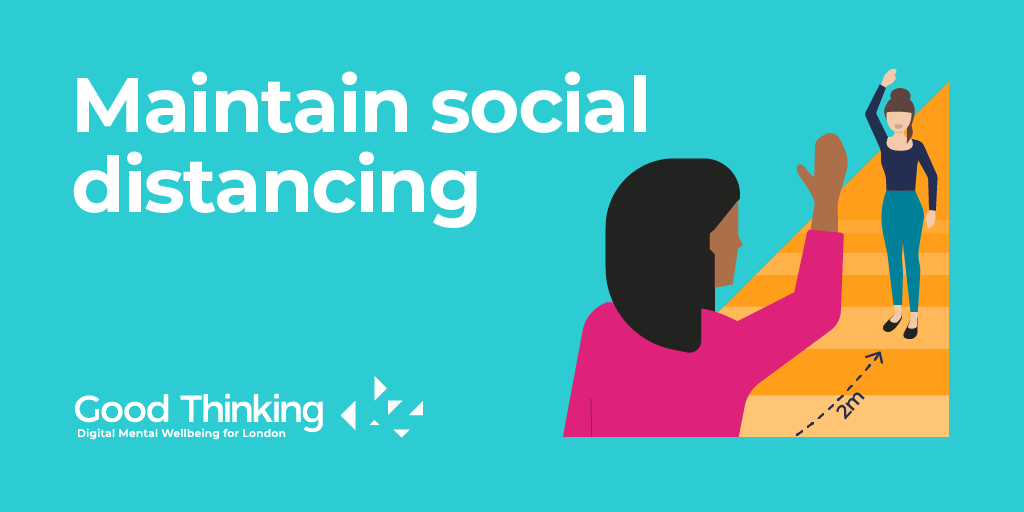
6. Headlines from the Good Thinking service
4.1 Level of demand – how many Londoners are seeking help online?
4.1.1 Has the number of visitors to Good Thinking changed during COVID-19?
Traffic to Good Thinking increased substantially during the COVID-19 pandemic, particularly during April-June 2020. The graph below demonstrates users to the site; the normal baseline shows little variability between December 2019 and February 2020, compared to the large increases in traffic starting in March and lasting until June. Average daily traffic to Good Thinking from December 1st to March 13th was 307 new users per day with an average of 377 visits per day (some users making return visits to the site). This rose to an average of 1,056 users per day from March to June. During the peak month of May, this rose to an average of 1,667 users per day, over five and a half times the previous baseline. This meant a record 51,670 users access the service in one month. Many of these users visited the site more than once, with an average of 2,400 visits per day.
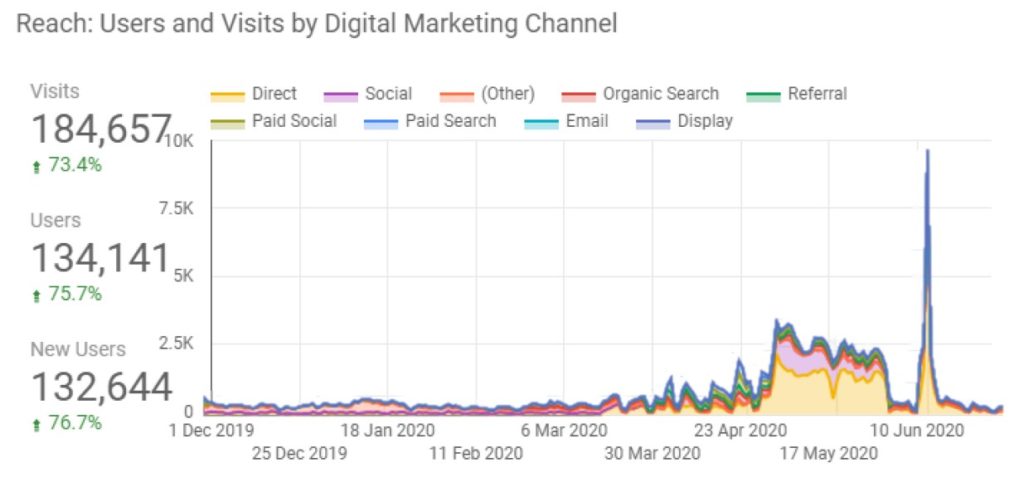
The monthly baseline number of users pre-COVID-19 (December to February) was 9,083 shown on the diagram below. During the COVID-19 period (March to June) this number rose threefold to an average 27,000 users per month. These 108,000 users accessed the site 150,000 times. This is likely to have resulted in part from increased promotion by the Good Thinking team, Thrive LDN, the Mayor of London and through partner organisation networks, as well as the wider trend for Londoners to access services via digital technologies during lockdown. In addition, there was a spike of over 9,000 new users prompted by a piece on Good Thinking in Money Saving Expert.
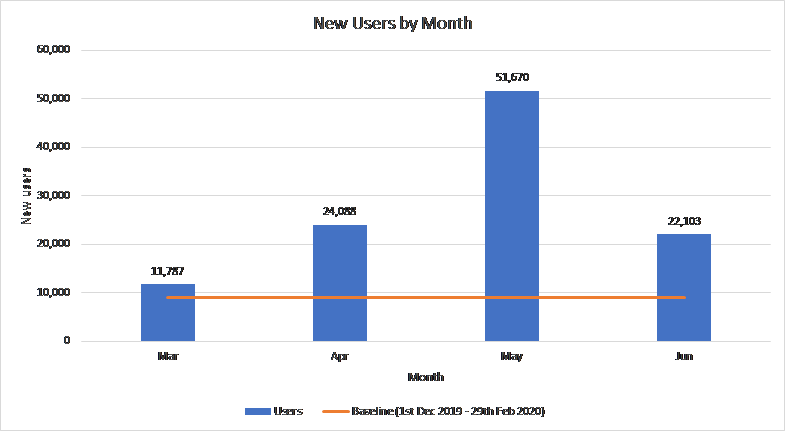
4.1.2 How have the conclusions from the completed Good Thinking self-assessments changed during COVID-19?
When undertaking the self-assessment, a set of clinically validated questions are answered on mental health symptoms and other needs. This leads to a page of personalised advice of where to obtain help known as ”conclusions”. Of 74,876 conclusions generated from the self-assessments during this period, approximately half (44-56%) of conclusions related to alcohol use and anxiety. The proportion of conclusions indicating issues with sleep increased significantly during this period, up to a third of all conclusions in April and June.
Good Thinking refers people to resources to manage alcohol use as well as to improve sleep quality. The programme is currently expanding these resources in response to this information emerging from the self-assessment.
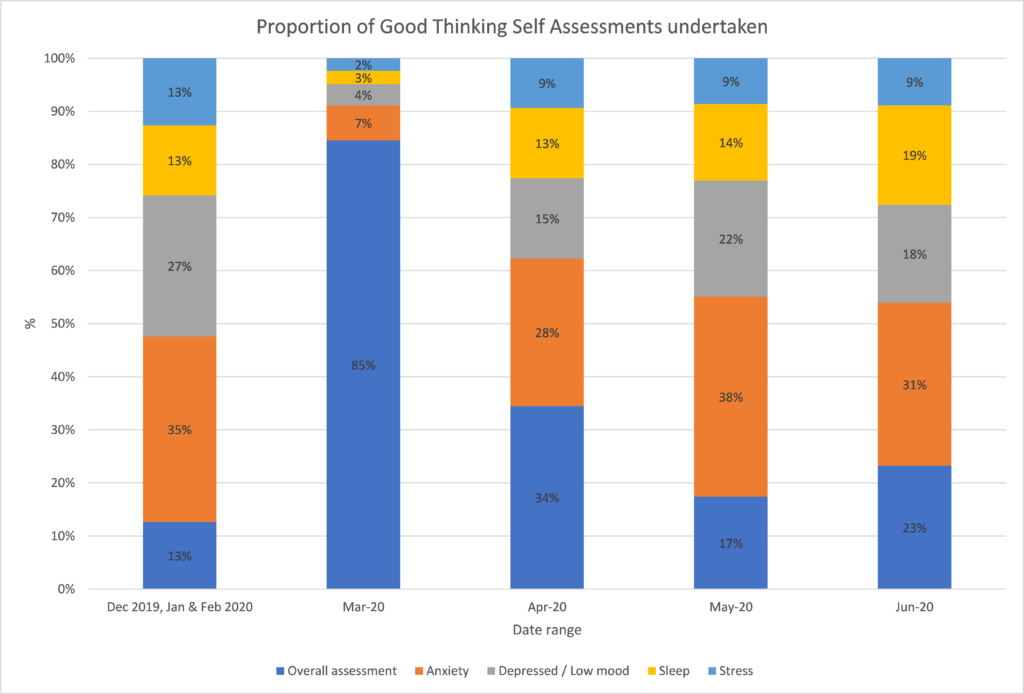
4.1.3 Has the type of personalised support changed during COVID-19?
Over 6,700 people completed the short quizzes to provide them with personalised self-care support.
- Responses remained relatively consistent with those seen outside the COVID-19 period. A majority of people continued to want support that ‘assesses me’; is ‘free’; is ‘digital’, and for use ‘by myself’.
- This reinforces Good Thinking’s main aim of providing individual, digital self-care as an accessible alternative to traditional services. The presence of a majority of people wanting free resources supports the ongoing provision of free tools for Londoners. This helps to reduce inequalities by providing them at source for all those who would like to benefit from digital tools.
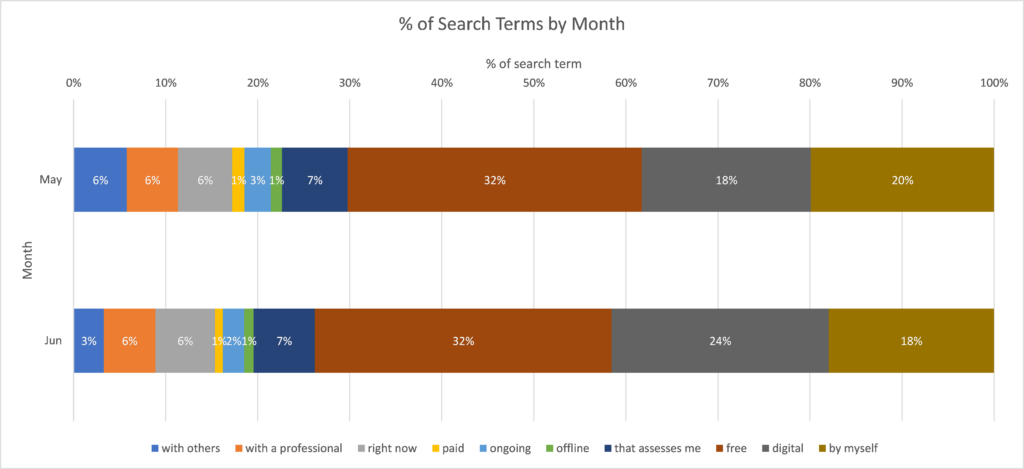
Users have directly reported the beneficial effects of some of the self-care tools during COVID-19.
“I started the course when I was suffering with long term effects of COVID – my physical symptoms were worsened by overwhelming anxiety. The course helped me to face the challenge of returning to my normal activities and I feel strengthened by knowing techniques that I can call on when needed” Helen, July 2020. Testimonial from Be Mindful
4.1.4 Qualitative feedback from surveys carried out with Partnership for Young London
Healthy London Partnership (host organisation for Good Thinking) has been collaborating with Partnership for Young London (PYL) and Global Video App TikTok to run a bi-weekly project with young people aged 14-24 in and around London to better understand their experiences of COVID-19. The Checking in: Voices of young people during lockdown report is part of an ongoing research programme overseen by Clinical Lead Dr Richard Graham into how young people are coping during lockdown and will help to shape content and responses for young people.
The age range for the group is between 14-24, and the majority (approx. 95%) live in London. Of the 32 London boroughs, 24 are represented in the cohort. The group includes young people with disabilities, care leavers and young people from BAME communities. 83 responded to the first survey. Of those, 37 identified as male, 45 as female and one as non-binary.
The key themes that emerged from the surveys in the first eight weeks are outlined below. Data will continue to be collected through bi-weekly surveys.
Going outside A third of respondents said they left the house once a week or less during lockdown. This suggested that young people were going beyond government advice and were imposing even greater restrictions upon themselves. Such extreme confinement may negatively impact young people’s mental health and the quality of their sleep, especially if they are not exercising or getting enough exposure to daylight, which could affect both their Vitamin D levels and sleep. Longer-term, it may indicate respondents are anxious about the outside world and may struggle with readjustment.
Mental health We found some indications that those with pre-existing mental health problems are struggling more. This supports quantitative studies that indicate this group is at higher risk of negative mental health impacts during lockdown.
Self-reflection – monotony Boredom/cabin fever was a key theme of lockdown. As external activities/distractions are limited by isolation, the inevitable increase in self-reflection, of responders being in closer contact with themselves, was challenging. On the one hand, this was forcing an identity crisis – how they define themselves in the lockdown – but it was also proving to be an opportunity to reconnect with their values and what was important to them. Some respondents found self-reflection easy, others less so. This suggested that some young people would benefit from tools to assist self-reflection and help them establish future goals.
Finances Whilst the majority reported they could get helpful information regarding health, when it came to other areas of life such as finances, work or claiming benefits, far less knew how to find information. This suggested that better information on money and employment is needed.
Coping with uncertainty Respondents were given an opportunity to tell us what was on their minds to help us better understand how they were coping with the inevitable uncertainty of a global pandemic. The majority didn’t comment, suggesting they had a good understanding of the ‘known unknowns’. Some acknowledged uncertainty was inevitable in a global pandemic, however, about a third were struggling with the uncertainty of the pandemic, which suggests there is a need for support to help young people acknowledge and bear the uncertainty.
4.1.5 Qualitative feedback
Search intent research is a methodology used to understand how people act online when using search engines such as Google Search to find the information they need. This can provide valuable insights into the issues being faced by people and the help they are seeking, especially as they search anonymously.
Good Thinking’s digital media marketing partner, Fresh Egg, is conducting two weekly search intent research into the broad topic of mental health. This identifies terms that are ‘rising’ (those with the biggest increase in search frequency compared to the preceding time period), were ‘top’ (the most popular topics or search queries), or were ‘breakout’ terms (those with a tremendous increase, because they are new and had few if any, prior searches).

The following key areas of focus emerged from the online search research:
- Social anxiety (may relate to easing of lockdown)
- ‘Can stress cause fever?’ (suggests uncertainties about health and impact of misinformation)
- PTSD/complex PTSD
- What to say to someone who is depressed
Other topics that people were searching for included:
- Are mental health hospital services open?
- When will mental health services re-open?
- What mental health services are available?
- Where to get mental health help/counselling/check/diagnosis?
- Which mental health professional should I see?
- Which mental health professional is a medical doctor?
- What/which mental health disorder do I have?
- Can mental health be cured?
- Will my mental health get better?
The above questions show that many of those searching are further along their journey to seeking help. Their searches show evidence of awareness of mental health concerns and a desire to do something about it.
4.2 How are Londoners using Good Thinking?
4.2.1 What common mental health problems are Londoners indicating through the use of Good Thinking during COVID-19?
26,182 Good Thinking quizzes for the four common mental health disorders (anxiety, low mood, sleep deprivation, stress) were undertaken during the COVID-19 period. Those completing have self-indicated greater levels of anxiety than low mood, sleep deprivation and stress. However, the proportion self-indicating levels of sleep deprivation has risen during COVID-19 and in June 2020 overtook low mood as the second most popular of the four quizzes on Good Thinking.
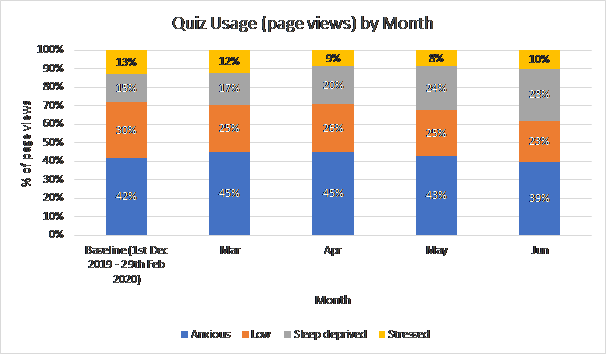
4.2.2 Has the age range of visitors to Good Thinking changed during COVID-19?
The age demographics of visitors to Good Thinking have remained relatively constant during COVID-19 with the 25-34 and 35-44 year old age groups continuing to represent the greatest proportion of visitors. However, a significant number of people over the age of 55 use the service – around 25% in May and June.
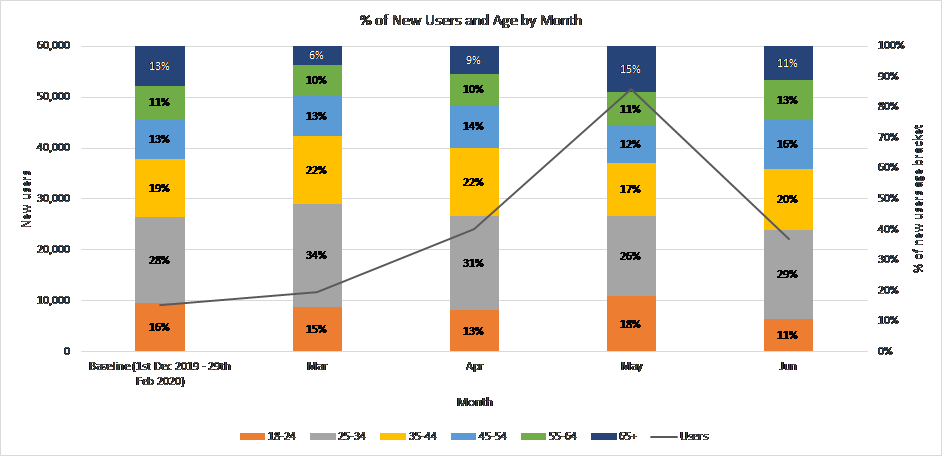
4.2.4 Has the time of day/day of the week of visits t Good Thinking changed during COVID-19?
Day of the week
- Between March-April, the proportion of traffic to Good Thinking during weekdays increased marginally, resulting a smaller proportion during the weekends. In April, there also appeared to be a slight increase in traffic on Thursdays.
- NB: A successful promotional campaign that ran on a Wednesday during June 2020 is responsible for the outlying data appearing in June 2020.

Time of the day
- In line with non-COVID-19 usage, the majority of visitors access the service between 0800h and 1500h. As a 24/7 service, a significant number of visitors continue to access Good Thinking throughout the night.
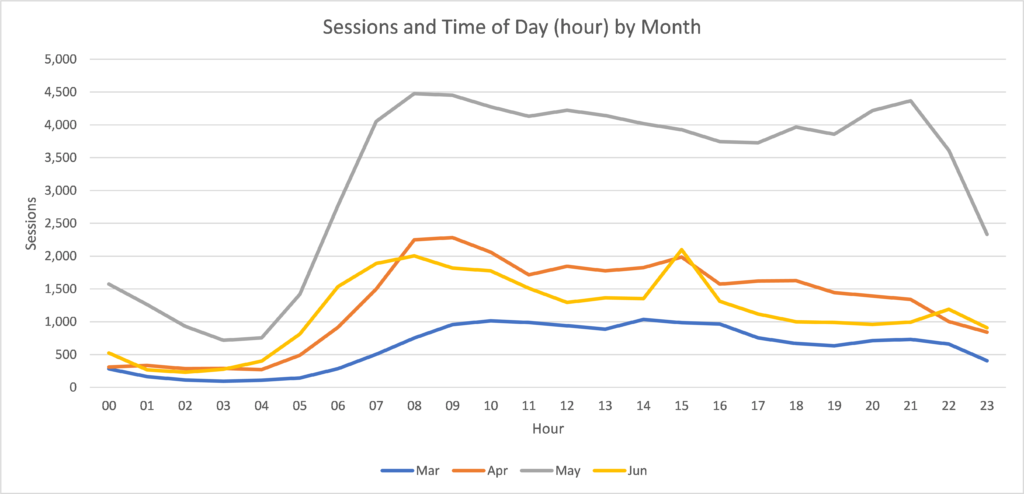
4.2.5 Has the proportion of people accessing urgent support through Good Thinking changed during COVID-19?
The proportion of visitors to Good Thinking who go on to visit the web pages of the organisations listed on the urgent support pages has remained under 0.5% of all visitors despite the increase in traffic during COVID-19.
4.2.6 Has the proportion of people accessing psychological therapies / IAPT through Good Thinking changed during COVID-19?
- The proportion of visitors who elect to journey to the IAPT webpages has remained under 1.8% of all visitors during 2020. During May 2020 when traffic to Good Thinking increased significantly, this fell to 0.5%.
- This aligns with the results of the quizzes indicating that visitors to Good Thinking do not tend to seek offline support. However, Good Thinking will continue to explore the support required by those who are now able to self-indicate support ‘in my local area’ through the quizzes
- Good Thinking includes a webpage dedicated to IAPT services.
4.2.7 What insights can be taken from the content added to Good Thinking during COVID-19?
- Good Thinking has published over 70 COVID-19-related articles, blogs and podcasts since March 2020, https://www.good-thinking.uk/coronavirus/. The most popular articles related to advice for or about children and young people – see below list of top five articles below. This is of interest as Good Thinking is currently aimed at over 18s. It supports the need to expand the service to a younger audience, work that is currently underway.
Advice for children and young people
Advice for parents and carers of children with autistic spectrum disorder and learning disabilities
How to look after your mental health during the coronavirus outbreak
Five ways to good mental wellbeing
Q&A: How to stay mentally well during self-isolation
7. Recommendations
This report has provided Good Thinking and wider system partners with a rich source of information to enable the service to continue to respond to Londoners’ mental well-being needs caused by the impacts of the pandemic.
Good Thinking service will:
- Continue to consider how the insights and opportunities from the digital world can further support London’s health and care system with planning for the Transition and Recovery periods of COVID-19.
- Continue to work with Thrive LDN to ensure those groups most disadvantaged by COVID-19 are supported on and off-line given the risk of recurrence and/or localised outbreaks.
- Consider the use of targeted anonymous polling/data collection (“painted doors”) to explore and identify the main contributory factors that manifest in alcohol, anxiety and sleep issues. Current self-assessment scales address these areas in a generic manner (e.g. the Generalised Anxiety Disorder GAD7 for anxiety). Polls could expand upon this, and identify health worries; money worries; employment worries etc. This will help to identify more specific areas for support through Good Thinking and within the wider health and care landscape.
- Following our successful smoking cessation campaign, the prominence of alcohol and sleep issues, suggests similar campaigns, linked to resources on Good Thinking, would be helpful to some of the most vulnerable Londoners.
- Work with wider partners including Thrive LDN to develop and include content on wider mental health services, and consider a decision aid to help people navigate and seek support from mental health services if desired (this may be a minority audience for Good Thinking, as most want free, digital support ‘by myself’).
- Continue to build on links with industry to promote behaviour change campaigns.
- Consider a campaign to help people (with a focus on young people) leave their home more regularly to regain confidence and overcome health anxieties.
- Work closely with clinical experts and wider stakeholders to provide additional support for those experiencing:
- Health anxiety and avoidance
- Post-traumatic stress disorder
- Physical activity/diet/weight management to mitigate some of the factors that may contribute to disproportionate impact of COVID-19
- Continue to analyse and collect data to garner further insights for inclusion within the July and August 2020 Good Thinking insights reports to inform the wider London response to COVID-19 including collating data:
- From new audiences such as the 300 Social Prescribing Link Workers
- From research conducted by an East London GP Imrana Siddiqui
- Exploration of search intent themes with Fresh Egg:
- Services, location and whether they are open
- Diagnosis
- Improving or recovering
- The relationship between physical and mental health, and the impact of misinformation.
Regional mental health leadership:
- Enhance messaging that both digital mental health and IAPT services are available and can be accessed.
Thrive LDN and PHE:
- Continue to include Good Thinking insights within the wider research and intelligence reports being collated by ThriveLDN with Public Health England.
